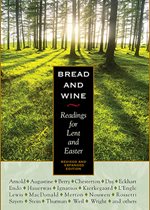
Bread and Wine: Readings for Lent and Easter
Dietrich Bonhoeffer, Dorothy Day, Søren Kierkegaard, C. S. Lewis, Philip Yancey, Eberhard Arnold, Edith Stein, Christoph Friedrich Blumhardt, J. Heinrich Arnold, Fyodor Dostoyevsky, Dorothy L. Sayers, Johann Christoph Arnold, George MacDonald, Henri J. M. Nouwen, Sadhu Sundar Singh, Thomas Merton, Christina Rossetti, Leo Tolstoy, N. T. Wright, William H. Willimon, Meister Eckhart, Erik Varden, Jakob Hutter, Peter Riedemann, Julian of Norwich, Stanley Hauerwas, Ignatius of Antioch, Clement of Rome, Gregory of Nazianzus, Hildegard of Bingen, Archbishop Angaelos, John Chrysostom, Howard Thurman, Cyril of Jerusalem, Catherine de Hueck Doherty, Malcolm Guite, Tish Harrison Warren, Alastair Roberts, Cardinal Kurt Koch, Adrienne von Speyr, Hannah Whitall Smith, Johann Ernst von Holst, Wendell Berry and Kwon Jeong-saeng
Coming in January 2026: Ninety-six daily reflections for Lent and Eastertide plumb the depths of a wealth of Christian traditions. Read More